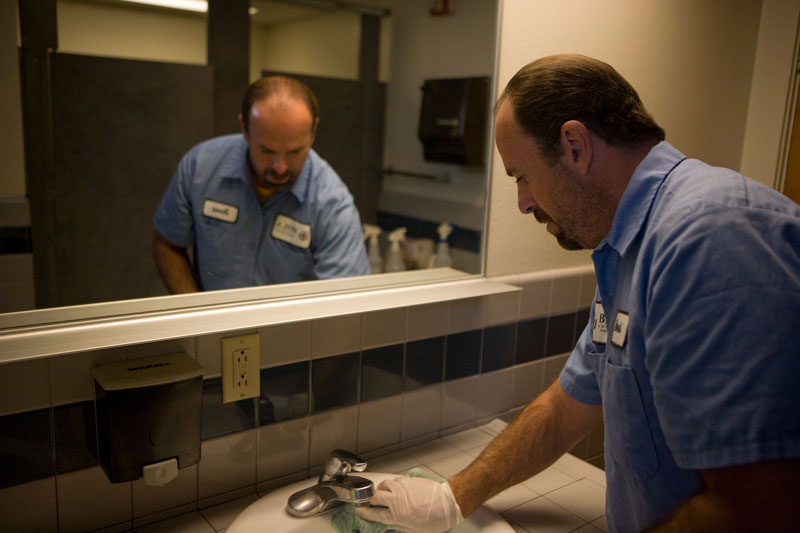At a time when Christmas cheer should be lightening hearts, some staff members at Biola and other Christian universities particularly feel the burden of today’s strained economy.
Economy-related layoffs, which have affected several staff members in the past year, may increase slightly next year, announced President Corey at an employee meeting last Monday. The “possibility of minimal” reductions will be clarified after plans for the ’10- ’11 budget, now underway, are finalized. The implications of a weakened economy, such as possibly lower enrollment, have to impact jobs at some point, even though layoffs are far from a first resort, Corey told employees.
“While I cannot promise that the economy will not have an impact on jobs, I can assure you that it is our first choice to make adjustments in other areas,” Corey said.
While many schools have implemented programs like Biola’s Student Emergency Relief Fund (SERF) to alleviate students’ financial burdens, most employees must make do with the same amount of pay — if not less. Unfortunately, even Christian higher education boils down to a matter of business at times, as Julie Frescas, director of human resources at Cal Baptist University, confirmed.
“Our students are our customer,” she said. “And so our customers do go first.”
Biola has allowed for marginal pay increases in the cases of some staff members in the past year, said Ron Mooradian, senior director of human resources. Biola’s staff hiring policy over the past year has been a “soft freeze,” as he put it. As the university entered into the academic year with a “no growth” mentality, practically no new positions have been created, and candidates for posts that need refilling must now be approved by the vice president of university services.
But many Christian colleges have had to make more sacrifices than Biola has to stay afloat.
The flailing economy prompted Cal Baptist University to suspend its 403(b) retirement savings program and lay off about a dozen employees over the past year, Frescas said.
Many employees at Westmont College were upset after the school began requiring all its employees to pay $25 a month for their own medical coverage, a service that was previously free.
Some schools, like Westmont College, Bethel College in Indiana and Gordon College in Massachusetts, have implemented salary freezes across the board for the 2009-2010 academic year.
At Illinois’ Wheaton College, a school that has seen less than five layoffs but is uncertain about the future, Chris Wooder, senior director of human resources at Wheaton, has watched the majority of staff members divide into two camps — those grateful for a job and those frightened for the future. While the former group speaks for the majority, “the latter is the louder of the two,” he said. The most dramatic change for staff members has been more of an “emotional change” and a “paranoia” than anything tangible, he said.
Taylor University in Indiana is an exception in the world of Christian higher education. The school saw record enrollment this fall, and staff and faculty benefited from pay increases across the board, said Jim Gerringer, director of media relations at Taylor.
Mooradian said he was impressed by the stamina of Biola’s staff, but acknowledged that uncertainty about the future has unsettled many.
“When economic times are bad, morale is always a challenge,” he said. “I think our people have done a great job of hanging in there. But we are still people.”
At Biola, the question of what the future holds is at the forefront of many minds.
“It’s just been a kind of ‘wait and see’ kind of thing,” said Pat Fithian, a campus electrician.
Frequent updates on the reality of the economy’s effects on Biola from the President’s Office are necessary to qualm fears about the unknown, as Corey and Mooradian emphasized.
“Whenever an organization goes through difficult times, the importance of communication goes up exponentially,” Mooradian said.
Brian Phillips, senior director for facilities services at Biola, noticed that more messages have come directly from the President’s Office over the past year than previous years, and Corey’s appearances at employee meetings and videos posted online have helped employees stay informed and cared for, he said.
“I have heard that some of you have seen that this has been one of the hardest Biola work years in recent memory,” Corey said in his address to employees. “… I’m trying to learn through this and tell you the straight story while determining on the fly how to adjust while at the same time express to you as employees that I, we, genuinely value and appreciate you.”
While job cuts are down for the eighth month in a row in November, and some predictions show the economic slump is slowing, Christian colleges are “not out of the woods,” as Corey acknowledged last Monday.
These financial strains imposed by the recession are only heightened as California demographics show a flattening of high school graduates, and thus, a smaller pool of college-aged citizens, from about 2009-2018, Corey recognized.
For now, perhaps all Biola and other Christian colleges can do is watch, wait … and pray.
Gerringer said schools need to rely on God, who “is not limited by any recession.”
Carolyn White, auxiliary operations manager at Biola, echoed his statement.
“We don’t know what tomorrow holds, but we do know who holds tomorrow,” White said.







